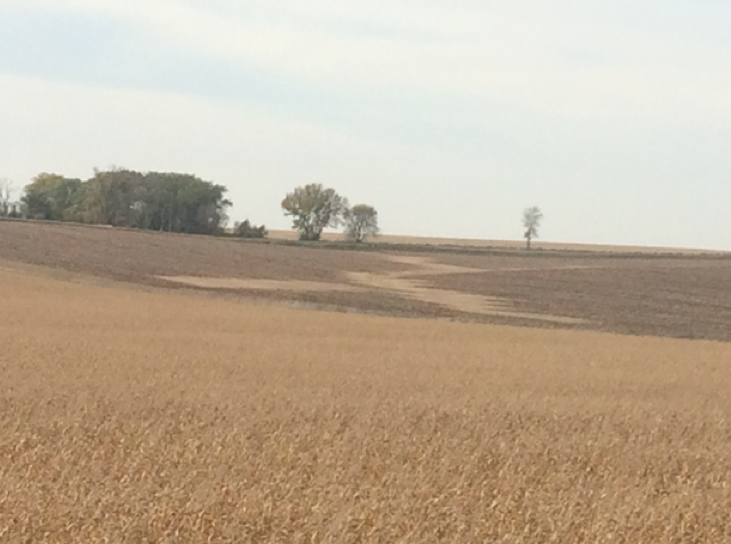By Anthony Bly, Extension Soils Field Specialist; Sara Berg, Extension Agronomy Field Specialist
In a number of tilled fields this fall there appears to be an attempt to improve soil health. Creative or recreational tillage has been applied to certain upland areas of some fields to possibly control rill and gully erosion while drainage ways were not tilled (photo). The thought process behind the tillage pattern used in the picture assumes that water will run-off the steeper slopes and the absence of tillage in the waterways will slow or prevent gully erosion. This is only a Band-Aid approach to solving a bigger problem with water infiltration into the soil on hill slopes and waterways.
Improving Long-Term Soil Health
 An appropriate way to solve this problem would be to stop tillage, let the soil develop structure, and allow earthworms and plant roots to form pores and structure in the soil. No-till also builds soil carbon and organic matter, which also improves soil water storage and stops water run-off by improving water infiltration into the soil. However, stopping tillage is not the total answer either. Improved soil health is achieved by using diverse crop rotations, cover crops when possible, and integrating livestock.
An appropriate way to solve this problem would be to stop tillage, let the soil develop structure, and allow earthworms and plant roots to form pores and structure in the soil. No-till also builds soil carbon and organic matter, which also improves soil water storage and stops water run-off by improving water infiltration into the soil. However, stopping tillage is not the total answer either. Improved soil health is achieved by using diverse crop rotations, cover crops when possible, and integrating livestock.
Benefits of Diverse Crop Rotations
Diverse crop rotations slow and prevent pest resistance, provide different rooting patterns for improved soil structure development, add amounts/ratios of carbon and nitrogen, and provide crop producers the ability to include cover crops. Diverse cover crop blends provide a food buffet for soil biology while keeping a living root in the soil to promote soil structure formation through root/microbe nutrient and energy exchange. Livestock benefit from cover crop forage and return/distribute nutrients back to the soil. Livestock grazing in the winter provides additional plant residue breakdown and nutrients returned to the soil when soil biology is dormant.
For more information about soil health topics visit the USDA/NRCS soil health page, the South Dakota Soil Health Coalition, or the South Dakota No-till Assn.





